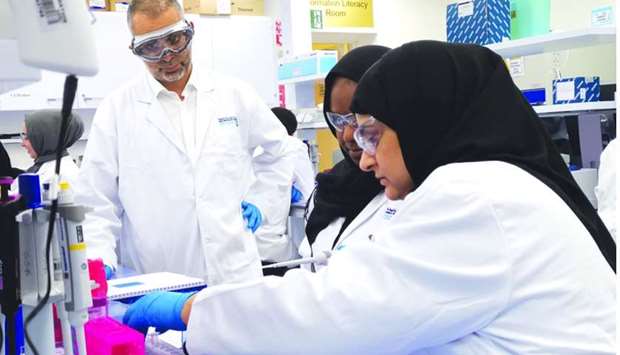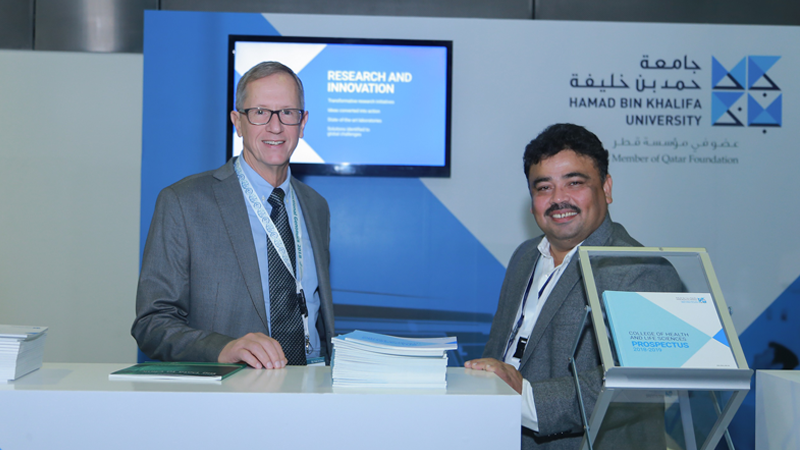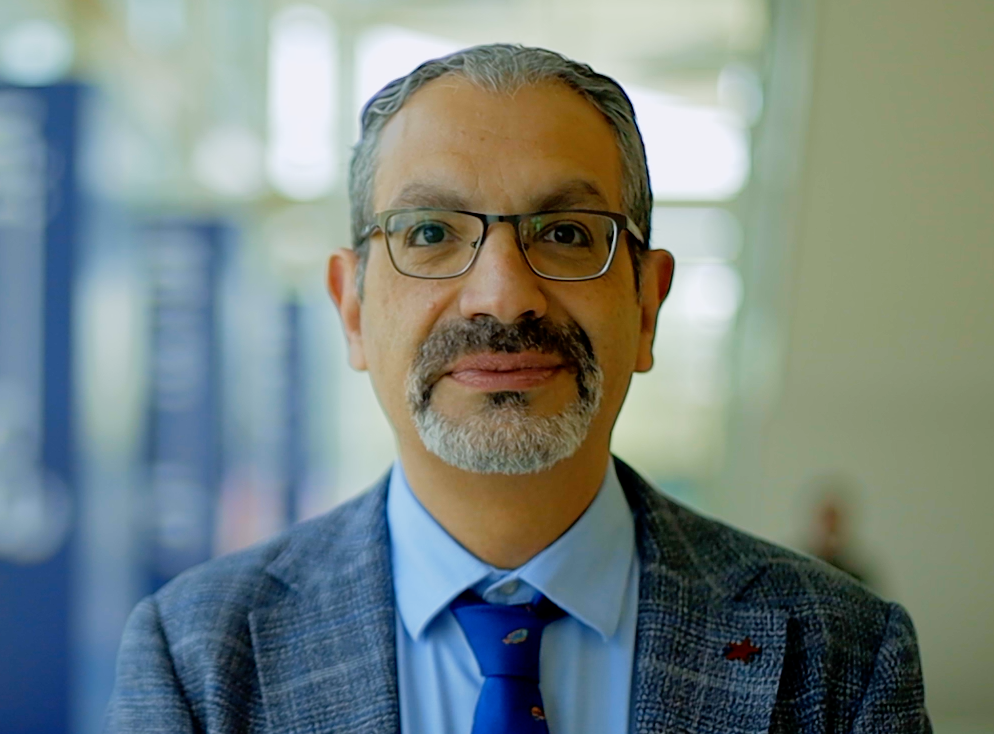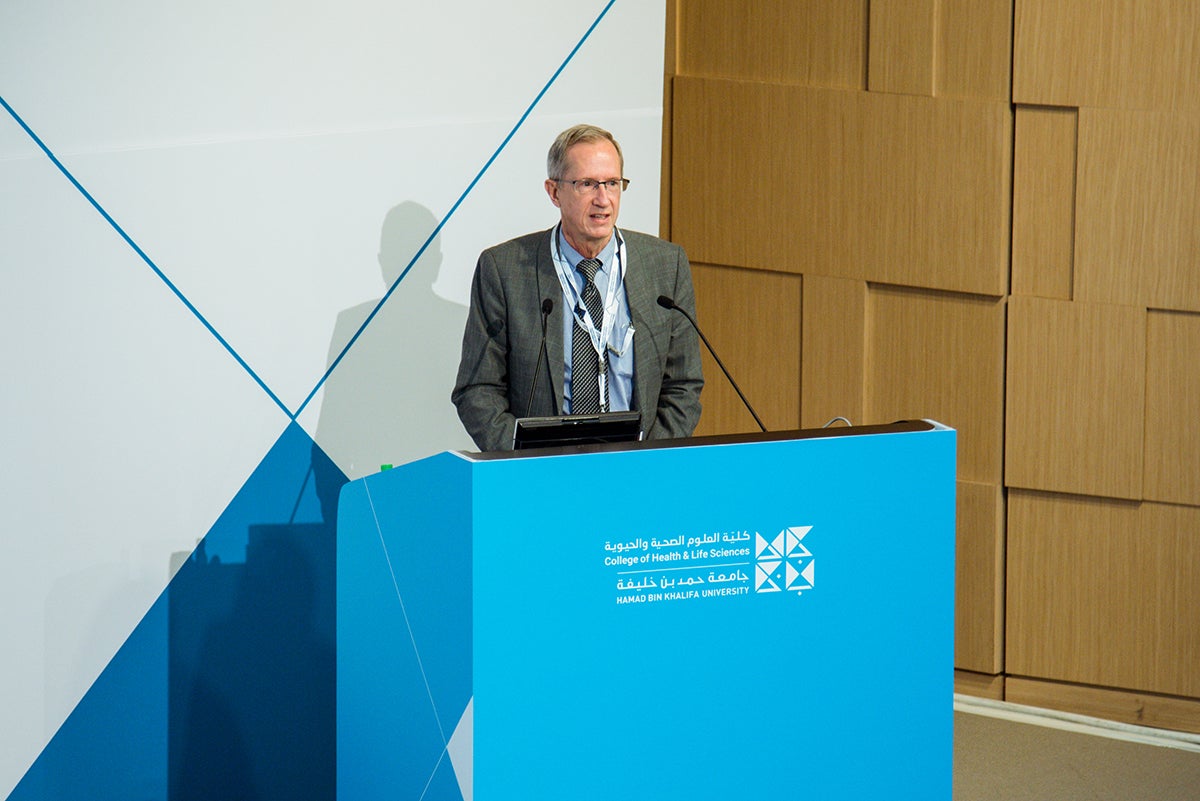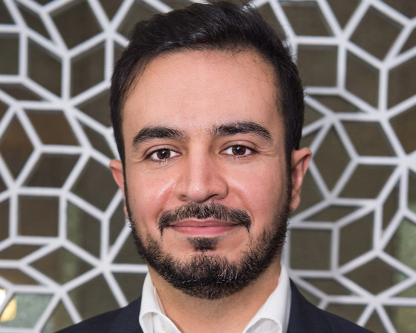
HBKU Part of Global Study on Rare Inherited Cholesterol Disorder
Study assesses genetic characteristics and current treatment practices for severe disease

A faculty member at Hamad Bin Khalifa University’s College of Health and Life Sciences (CHLS) recently took part in a global clinical collaboration to study a life-threatening blood cholesterol disease, homozygous familial hypercholesterolaemia (HoFH). The study has now been published in The Lancet - one of the highest impact medical journals globally.
Dr. Georges Nemer, Professor of Genomics and Precision Medicine and Interim Dean of CHLS, was an international clinical collaborator in the retrospective cohort study on the worldwide experience of HoFH. The rare inherited disorder results in extremely high levels of low-density lipoprotein cholesterol levels that cause premature atherosclerotic cardiovascular disease (ASCVD).
The study constituted the largest international cohort of HoFH patients to date, with 751 patients from 38 countries. Data was collected by the HoFH International Clinical Collaborators registry, the first and only such global registry initiated by physicians caring for HoFH patients in diverse healthcare settings.
The objective was to assess the clinical and genetic characteristics, as well as the impact, of current practice on the health outcomes of HoFH patients globally. Current guidance about management and prognosis stems from small studies, mostly from high-income countries.
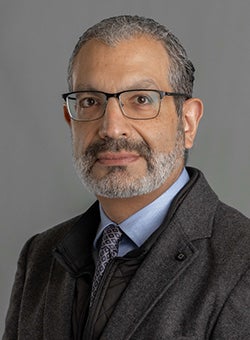 Dr. Nemer explained their findings: “Analysis of the data clearly shows the need for improving patient care for those living with this severe, life-threatening condition. Worldwide, patients with HoFH are diagnosed too late, and are undertreated, and that places them at high premature risk of cardiovascular disease. HoFH patients require early diagnosis to start treatment and prevent avoidable complications, and this requires better screening and education.”
Dr. Nemer explained their findings: “Analysis of the data clearly shows the need for improving patient care for those living with this severe, life-threatening condition. Worldwide, patients with HoFH are diagnosed too late, and are undertreated, and that places them at high premature risk of cardiovascular disease. HoFH patients require early diagnosis to start treatment and prevent avoidable complications, and this requires better screening and education.”
The data also highlighted significant inequalities in the management of HoFH patients globally, especially access to effective multi-lipid-lowering therapies in non-high-income countries. This finding demands “a critical re-evaluation” of health policy to improve outcomes for all HoFH patients.
Dr. Omar Albagha, Professor of Genomics and Precision Medicine at CHLS, commented: “The global nature and scale of this study holds promise for establishing a uniform, world-wide approach to managing this disease. At CHLS, we welcome such opportunities to join efforts with the global scientific community, and to see the results shared in a high-impact journal. It ties into our ongoing efforts to translate genetic research into precision medicine approaches that address clinical challenges and improve population health and well-being in Qatar and further afield.”
Students interested in enrolling in one of HBKU’s wide-ranging graduate programs should visit admissions.hbku.edu.qa.
Related News

HBKU College of Health and Life Sciences and Equine Veterinary Medical Center Sign MoU

College of Health and Life Sciences Talk Spotlights Renowned Scientist’s Breakthrough on Cell Death-Driven Inflammation

Faculty at College of Health and Life Sciences Selected as Members of the Royal Society of Biology

HBKU’s College of Health and Life Science Researchers Awarded Two Major Grants
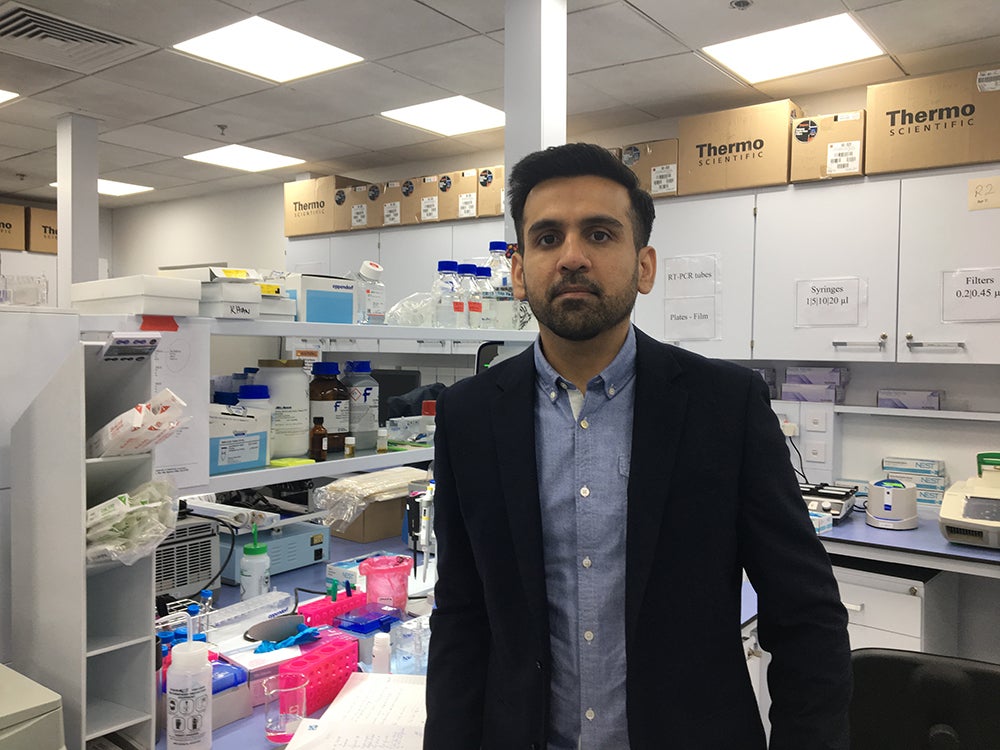
HBKU College of Health and Life Sciences Faculty Member Elected to Prestigious Biology Council

HBKU’s College of Health and Life Sciences Graduates Tackling Qatar’s Pressing Challenges

HBKU College of Health and Life Sciences and Equine Veterinary Medical Center Sign MoU

College of Health and Life Sciences Talk Spotlights Renowned Scientist’s Breakthrough on Cell Death-Driven Inflammation

Faculty at College of Health and Life Sciences Selected as Members of the Royal Society of Biology

HBKU’s College of Health and Life Science Researchers Awarded Two Major Grants

HBKU College of Health and Life Sciences Faculty Member Elected to Prestigious Biology Council

HBKU’s College of Health and Life Sciences Graduates Tackling Qatar’s Pressing Challenges

HBKU College of Health and Life Sciences and Equine Veterinary Medical Center Sign MoU

College of Health and Life Sciences Talk Spotlights Renowned Scientist’s Breakthrough on Cell Death-Driven Inflammation

Faculty at College of Health and Life Sciences Selected as Members of the Royal Society of Biology

HBKU’s College of Health and Life Science Researchers Awarded Two Major Grants

HBKU College of Health and Life Sciences Faculty Member Elected to Prestigious Biology Council

HBKU’s College of Health and Life Sciences Graduates Tackling Qatar’s Pressing Challenges

HBKU College of Health and Life Sciences and Equine Veterinary Medical Center Sign MoU

College of Health and Life Sciences Talk Spotlights Renowned Scientist’s Breakthrough on Cell Death-Driven Inflammation

Faculty at College of Health and Life Sciences Selected as Members of the Royal Society of Biology

HBKU’s College of Health and Life Science Researchers Awarded Two Major Grants

HBKU College of Health and Life Sciences Faculty Member Elected to Prestigious Biology Council

HBKU’s College of Health and Life Sciences Graduates Tackling Qatar’s Pressing Challenges

HBKU College of Health and Life Sciences and Equine Veterinary Medical Center Sign MoU

College of Health and Life Sciences Talk Spotlights Renowned Scientist’s Breakthrough on Cell Death-Driven Inflammation

Faculty at College of Health and Life Sciences Selected as Members of the Royal Society of Biology

HBKU’s College of Health and Life Science Researchers Awarded Two Major Grants

HBKU College of Health and Life Sciences Faculty Member Elected to Prestigious Biology Council

HBKU’s College of Health and Life Sciences Graduates Tackling Qatar’s Pressing Challenges

HBKU College of Health and Life Sciences and Equine Veterinary Medical Center Sign MoU

College of Health and Life Sciences Talk Spotlights Renowned Scientist’s Breakthrough on Cell Death-Driven Inflammation

Faculty at College of Health and Life Sciences Selected as Members of the Royal Society of Biology

HBKU’s College of Health and Life Science Researchers Awarded Two Major Grants

HBKU College of Health and Life Sciences Faculty Member Elected to Prestigious Biology Council

HBKU’s College of Health and Life Sciences Graduates Tackling Qatar’s Pressing Challenges

HBKU College of Health and Life Sciences and Equine Veterinary Medical Center Sign MoU

College of Health and Life Sciences Talk Spotlights Renowned Scientist’s Breakthrough on Cell Death-Driven Inflammation

Faculty at College of Health and Life Sciences Selected as Members of the Royal Society of Biology

HBKU’s College of Health and Life Science Researchers Awarded Two Major Grants

HBKU College of Health and Life Sciences Faculty Member Elected to Prestigious Biology Council

HBKU’s College of Health and Life Sciences Graduates Tackling Qatar’s Pressing Challenges

HBKU College of Health and Life Sciences and Equine Veterinary Medical Center Sign MoU

College of Health and Life Sciences Talk Spotlights Renowned Scientist’s Breakthrough on Cell Death-Driven Inflammation

Faculty at College of Health and Life Sciences Selected as Members of the Royal Society of Biology

HBKU’s College of Health and Life Science Researchers Awarded Two Major Grants

HBKU College of Health and Life Sciences Faculty Member Elected to Prestigious Biology Council

HBKU’s College of Health and Life Sciences Graduates Tackling Qatar’s Pressing Challenges

HBKU College of Health and Life Sciences and Equine Veterinary Medical Center Sign MoU

College of Health and Life Sciences Talk Spotlights Renowned Scientist’s Breakthrough on Cell Death-Driven Inflammation

Faculty at College of Health and Life Sciences Selected as Members of the Royal Society of Biology

HBKU’s College of Health and Life Science Researchers Awarded Two Major Grants

HBKU College of Health and Life Sciences Faculty Member Elected to Prestigious Biology Council

HBKU’s College of Health and Life Sciences Graduates Tackling Qatar’s Pressing Challenges

HBKU College of Health and Life Sciences and Equine Veterinary Medical Center Sign MoU

College of Health and Life Sciences Talk Spotlights Renowned Scientist’s Breakthrough on Cell Death-Driven Inflammation

Faculty at College of Health and Life Sciences Selected as Members of the Royal Society of Biology

HBKU’s College of Health and Life Science Researchers Awarded Two Major Grants

HBKU College of Health and Life Sciences Faculty Member Elected to Prestigious Biology Council

HBKU’s College of Health and Life Sciences Graduates Tackling Qatar’s Pressing Challenges

HBKU College of Health and Life Sciences and Equine Veterinary Medical Center Sign MoU

College of Health and Life Sciences Talk Spotlights Renowned Scientist’s Breakthrough on Cell Death-Driven Inflammation

Faculty at College of Health and Life Sciences Selected as Members of the Royal Society of Biology

HBKU’s College of Health and Life Science Researchers Awarded Two Major Grants

HBKU College of Health and Life Sciences Faculty Member Elected to Prestigious Biology Council

HBKU’s College of Health and Life Sciences Graduates Tackling Qatar’s Pressing Challenges

HBKU College of Health and Life Sciences and Equine Veterinary Medical Center Sign MoU

College of Health and Life Sciences Talk Spotlights Renowned Scientist’s Breakthrough on Cell Death-Driven Inflammation

Faculty at College of Health and Life Sciences Selected as Members of the Royal Society of Biology

HBKU’s College of Health and Life Science Researchers Awarded Two Major Grants

HBKU College of Health and Life Sciences Faculty Member Elected to Prestigious Biology Council

HBKU’s College of Health and Life Sciences Graduates Tackling Qatar’s Pressing Challenges

HBKU College of Health and Life Sciences and Equine Veterinary Medical Center Sign MoU

College of Health and Life Sciences Talk Spotlights Renowned Scientist’s Breakthrough on Cell Death-Driven Inflammation

Faculty at College of Health and Life Sciences Selected as Members of the Royal Society of Biology

HBKU’s College of Health and Life Science Researchers Awarded Two Major Grants

HBKU College of Health and Life Sciences Faculty Member Elected to Prestigious Biology Council

HBKU’s College of Health and Life Sciences Graduates Tackling Qatar’s Pressing Challenges

HBKU College of Health and Life Sciences and Equine Veterinary Medical Center Sign MoU

College of Health and Life Sciences Talk Spotlights Renowned Scientist’s Breakthrough on Cell Death-Driven Inflammation

Faculty at College of Health and Life Sciences Selected as Members of the Royal Society of Biology

HBKU’s College of Health and Life Science Researchers Awarded Two Major Grants

HBKU College of Health and Life Sciences Faculty Member Elected to Prestigious Biology Council

HBKU’s College of Health and Life Sciences Graduates Tackling Qatar’s Pressing Challenges

HBKU College of Health and Life Sciences and Equine Veterinary Medical Center Sign MoU

College of Health and Life Sciences Talk Spotlights Renowned Scientist’s Breakthrough on Cell Death-Driven Inflammation

Faculty at College of Health and Life Sciences Selected as Members of the Royal Society of Biology

HBKU’s College of Health and Life Science Researchers Awarded Two Major Grants

HBKU College of Health and Life Sciences Faculty Member Elected to Prestigious Biology Council

HBKU’s College of Health and Life Sciences Graduates Tackling Qatar’s Pressing Challenges

HBKU College of Health and Life Sciences and Equine Veterinary Medical Center Sign MoU

College of Health and Life Sciences Talk Spotlights Renowned Scientist’s Breakthrough on Cell Death-Driven Inflammation

Faculty at College of Health and Life Sciences Selected as Members of the Royal Society of Biology

HBKU’s College of Health and Life Science Researchers Awarded Two Major Grants

HBKU College of Health and Life Sciences Faculty Member Elected to Prestigious Biology Council

HBKU’s College of Health and Life Sciences Graduates Tackling Qatar’s Pressing Challenges

HBKU College of Health and Life Sciences and Equine Veterinary Medical Center Sign MoU

College of Health and Life Sciences Talk Spotlights Renowned Scientist’s Breakthrough on Cell Death-Driven Inflammation

Faculty at College of Health and Life Sciences Selected as Members of the Royal Society of Biology

HBKU’s College of Health and Life Science Researchers Awarded Two Major Grants

HBKU College of Health and Life Sciences Faculty Member Elected to Prestigious Biology Council

HBKU’s College of Health and Life Sciences Graduates Tackling Qatar’s Pressing Challenges

HBKU College of Health and Life Sciences and Equine Veterinary Medical Center Sign MoU

College of Health and Life Sciences Talk Spotlights Renowned Scientist’s Breakthrough on Cell Death-Driven Inflammation

Faculty at College of Health and Life Sciences Selected as Members of the Royal Society of Biology

HBKU’s College of Health and Life Science Researchers Awarded Two Major Grants

HBKU College of Health and Life Sciences Faculty Member Elected to Prestigious Biology Council

HBKU’s College of Health and Life Sciences Graduates Tackling Qatar’s Pressing Challenges

HBKU College of Health and Life Sciences and Equine Veterinary Medical Center Sign MoU

College of Health and Life Sciences Talk Spotlights Renowned Scientist’s Breakthrough on Cell Death-Driven Inflammation

Faculty at College of Health and Life Sciences Selected as Members of the Royal Society of Biology

HBKU’s College of Health and Life Science Researchers Awarded Two Major Grants

HBKU College of Health and Life Sciences Faculty Member Elected to Prestigious Biology Council

HBKU’s College of Health and Life Sciences Graduates Tackling Qatar’s Pressing Challenges

HBKU College of Health and Life Sciences and Equine Veterinary Medical Center Sign MoU

College of Health and Life Sciences Talk Spotlights Renowned Scientist’s Breakthrough on Cell Death-Driven Inflammation

Faculty at College of Health and Life Sciences Selected as Members of the Royal Society of Biology

HBKU’s College of Health and Life Science Researchers Awarded Two Major Grants

HBKU College of Health and Life Sciences Faculty Member Elected to Prestigious Biology Council

HBKU’s College of Health and Life Sciences Graduates Tackling Qatar’s Pressing Challenges

HBKU College of Health and Life Sciences and Equine Veterinary Medical Center Sign MoU

College of Health and Life Sciences Talk Spotlights Renowned Scientist’s Breakthrough on Cell Death-Driven Inflammation

Faculty at College of Health and Life Sciences Selected as Members of the Royal Society of Biology

HBKU’s College of Health and Life Science Researchers Awarded Two Major Grants

HBKU College of Health and Life Sciences Faculty Member Elected to Prestigious Biology Council

HBKU’s College of Health and Life Sciences Graduates Tackling Qatar’s Pressing Challenges

HBKU College of Health and Life Sciences and Equine Veterinary Medical Center Sign MoU

College of Health and Life Sciences Talk Spotlights Renowned Scientist’s Breakthrough on Cell Death-Driven Inflammation

Faculty at College of Health and Life Sciences Selected as Members of the Royal Society of Biology

HBKU’s College of Health and Life Science Researchers Awarded Two Major Grants

HBKU College of Health and Life Sciences Faculty Member Elected to Prestigious Biology Council

HBKU’s College of Health and Life Sciences Graduates Tackling Qatar’s Pressing Challenges

HBKU College of Health and Life Sciences and Equine Veterinary Medical Center Sign MoU

College of Health and Life Sciences Talk Spotlights Renowned Scientist’s Breakthrough on Cell Death-Driven Inflammation

Faculty at College of Health and Life Sciences Selected as Members of the Royal Society of Biology

HBKU’s College of Health and Life Science Researchers Awarded Two Major Grants

HBKU College of Health and Life Sciences Faculty Member Elected to Prestigious Biology Council

HBKU’s College of Health and Life Sciences Graduates Tackling Qatar’s Pressing Challenges

HBKU College of Health and Life Sciences and Equine Veterinary Medical Center Sign MoU

College of Health and Life Sciences Talk Spotlights Renowned Scientist’s Breakthrough on Cell Death-Driven Inflammation

Faculty at College of Health and Life Sciences Selected as Members of the Royal Society of Biology

HBKU’s College of Health and Life Science Researchers Awarded Two Major Grants

HBKU College of Health and Life Sciences Faculty Member Elected to Prestigious Biology Council

HBKU’s College of Health and Life Sciences Graduates Tackling Qatar’s Pressing Challenges

HBKU College of Health and Life Sciences and Equine Veterinary Medical Center Sign MoU

College of Health and Life Sciences Talk Spotlights Renowned Scientist’s Breakthrough on Cell Death-Driven Inflammation

Faculty at College of Health and Life Sciences Selected as Members of the Royal Society of Biology

HBKU’s College of Health and Life Science Researchers Awarded Two Major Grants

HBKU College of Health and Life Sciences Faculty Member Elected to Prestigious Biology Council

HBKU’s College of Health and Life Sciences Graduates Tackling Qatar’s Pressing Challenges

HBKU College of Health and Life Sciences and Equine Veterinary Medical Center Sign MoU

College of Health and Life Sciences Talk Spotlights Renowned Scientist’s Breakthrough on Cell Death-Driven Inflammation

Faculty at College of Health and Life Sciences Selected as Members of the Royal Society of Biology

HBKU’s College of Health and Life Science Researchers Awarded Two Major Grants

HBKU College of Health and Life Sciences Faculty Member Elected to Prestigious Biology Council

HBKU’s College of Health and Life Sciences Graduates Tackling Qatar’s Pressing Challenges

HBKU College of Health and Life Sciences and Equine Veterinary Medical Center Sign MoU

College of Health and Life Sciences Talk Spotlights Renowned Scientist’s Breakthrough on Cell Death-Driven Inflammation

Faculty at College of Health and Life Sciences Selected as Members of the Royal Society of Biology

HBKU’s College of Health and Life Science Researchers Awarded Two Major Grants

HBKU College of Health and Life Sciences Faculty Member Elected to Prestigious Biology Council

HBKU’s College of Health and Life Sciences Graduates Tackling Qatar’s Pressing Challenges

HBKU College of Health and Life Sciences and Equine Veterinary Medical Center Sign MoU

College of Health and Life Sciences Talk Spotlights Renowned Scientist’s Breakthrough on Cell Death-Driven Inflammation

Faculty at College of Health and Life Sciences Selected as Members of the Royal Society of Biology

HBKU’s College of Health and Life Science Researchers Awarded Two Major Grants

HBKU College of Health and Life Sciences Faculty Member Elected to Prestigious Biology Council

HBKU’s College of Health and Life Sciences Graduates Tackling Qatar’s Pressing Challenges

HBKU College of Health and Life Sciences and Equine Veterinary Medical Center Sign MoU

College of Health and Life Sciences Talk Spotlights Renowned Scientist’s Breakthrough on Cell Death-Driven Inflammation

Faculty at College of Health and Life Sciences Selected as Members of the Royal Society of Biology

HBKU’s College of Health and Life Science Researchers Awarded Two Major Grants

HBKU College of Health and Life Sciences Faculty Member Elected to Prestigious Biology Council

HBKU’s College of Health and Life Sciences Graduates Tackling Qatar’s Pressing Challenges

HBKU College of Health and Life Sciences and Equine Veterinary Medical Center Sign MoU

College of Health and Life Sciences Talk Spotlights Renowned Scientist’s Breakthrough on Cell Death-Driven Inflammation

Faculty at College of Health and Life Sciences Selected as Members of the Royal Society of Biology

HBKU’s College of Health and Life Science Researchers Awarded Two Major Grants

HBKU College of Health and Life Sciences Faculty Member Elected to Prestigious Biology Council

HBKU’s College of Health and Life Sciences Graduates Tackling Qatar’s Pressing Challenges

HBKU College of Health and Life Sciences and Equine Veterinary Medical Center Sign MoU

College of Health and Life Sciences Talk Spotlights Renowned Scientist’s Breakthrough on Cell Death-Driven Inflammation

Faculty at College of Health and Life Sciences Selected as Members of the Royal Society of Biology

HBKU’s College of Health and Life Science Researchers Awarded Two Major Grants

HBKU College of Health and Life Sciences Faculty Member Elected to Prestigious Biology Council

HBKU’s College of Health and Life Sciences Graduates Tackling Qatar’s Pressing Challenges

HBKU College of Health and Life Sciences and Equine Veterinary Medical Center Sign MoU

College of Health and Life Sciences Talk Spotlights Renowned Scientist’s Breakthrough on Cell Death-Driven Inflammation

Faculty at College of Health and Life Sciences Selected as Members of the Royal Society of Biology

HBKU’s College of Health and Life Science Researchers Awarded Two Major Grants

HBKU College of Health and Life Sciences Faculty Member Elected to Prestigious Biology Council

HBKU’s College of Health and Life Sciences Graduates Tackling Qatar’s Pressing Challenges

HBKU College of Health and Life Sciences and Equine Veterinary Medical Center Sign MoU

College of Health and Life Sciences Talk Spotlights Renowned Scientist’s Breakthrough on Cell Death-Driven Inflammation

Faculty at College of Health and Life Sciences Selected as Members of the Royal Society of Biology

HBKU’s College of Health and Life Science Researchers Awarded Two Major Grants

HBKU College of Health and Life Sciences Faculty Member Elected to Prestigious Biology Council

HBKU’s College of Health and Life Sciences Graduates Tackling Qatar’s Pressing Challenges

HBKU College of Health and Life Sciences and Equine Veterinary Medical Center Sign MoU

College of Health and Life Sciences Talk Spotlights Renowned Scientist’s Breakthrough on Cell Death-Driven Inflammation

Faculty at College of Health and Life Sciences Selected as Members of the Royal Society of Biology

HBKU’s College of Health and Life Science Researchers Awarded Two Major Grants

HBKU College of Health and Life Sciences Faculty Member Elected to Prestigious Biology Council

HBKU’s College of Health and Life Sciences Graduates Tackling Qatar’s Pressing Challenges

HBKU College of Health and Life Sciences and Equine Veterinary Medical Center Sign MoU

College of Health and Life Sciences Talk Spotlights Renowned Scientist’s Breakthrough on Cell Death-Driven Inflammation

Faculty at College of Health and Life Sciences Selected as Members of the Royal Society of Biology

HBKU’s College of Health and Life Science Researchers Awarded Two Major Grants

HBKU College of Health and Life Sciences Faculty Member Elected to Prestigious Biology Council

HBKU’s College of Health and Life Sciences Graduates Tackling Qatar’s Pressing Challenges

HBKU College of Health and Life Sciences and Equine Veterinary Medical Center Sign MoU

College of Health and Life Sciences Talk Spotlights Renowned Scientist’s Breakthrough on Cell Death-Driven Inflammation

Faculty at College of Health and Life Sciences Selected as Members of the Royal Society of Biology

HBKU’s College of Health and Life Science Researchers Awarded Two Major Grants

HBKU College of Health and Life Sciences Faculty Member Elected to Prestigious Biology Council

HBKU’s College of Health and Life Sciences Graduates Tackling Qatar’s Pressing Challenges

HBKU College of Health and Life Sciences and Equine Veterinary Medical Center Sign MoU

College of Health and Life Sciences Talk Spotlights Renowned Scientist’s Breakthrough on Cell Death-Driven Inflammation

Faculty at College of Health and Life Sciences Selected as Members of the Royal Society of Biology

HBKU’s College of Health and Life Science Researchers Awarded Two Major Grants

HBKU College of Health and Life Sciences Faculty Member Elected to Prestigious Biology Council

HBKU’s College of Health and Life Sciences Graduates Tackling Qatar’s Pressing Challenges

HBKU College of Health and Life Sciences and Equine Veterinary Medical Center Sign MoU

College of Health and Life Sciences Talk Spotlights Renowned Scientist’s Breakthrough on Cell Death-Driven Inflammation

Faculty at College of Health and Life Sciences Selected as Members of the Royal Society of Biology

HBKU’s College of Health and Life Science Researchers Awarded Two Major Grants

HBKU College of Health and Life Sciences Faculty Member Elected to Prestigious Biology Council

HBKU’s College of Health and Life Sciences Graduates Tackling Qatar’s Pressing Challenges






